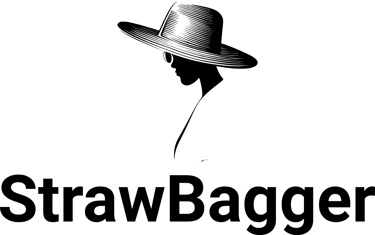Adopt a "strawbagger mindset!"

Lyocell
Lyocell: Its Benefits and Uses
Lyocell is a semi-synthetic fiber made from sustainably sourced wood pulp, typically from eucalyptus, beech, or spruce trees. It's produced using a closed-loop process that recycles water and solvents, minimizing environmental impact.
Benefits:
Eco-Friendly Production: Closed-loop process reduces waste and chemical use.
Soft and Breathable: Offers a comfortable feel, suitable for sensitive skin.
Moisture-Wicking: Keeps the wearer dry and comfortable.
Biodegradable: Naturally decomposes, reducing environmental waste.
Uses:
Clothing items like shirts, dresses, and underwear.
Home textiles such as bed linens and towels.
Activewear and casual wear.
Let's take a Closer Look at Lyocell
Lyocell as a Sustainable Fabric
1. What is Lyocell Fabric?
Lyocell is a type of semi-synthetic fabric made primarily from wood pulp, often sourced from eucalyptus, beech, oak, and bamboo trees.
It is part of the rayon family, but is produced through a closed-loop process that is significantly more environmentally friendly than traditional rayon or viscose production.
The most recognized brand of lyocell is TENCEL™, produced by the Austrian company Lenzing AG.
Known for its silky softness, breathability, and eco-conscious production, lyocell is gaining popularity in sustainable fashion, bedding, and even athletic wear.
2. Environmental Benefits
Closed-Loop Production Process:
Solvents used to break down wood pulp (typically N-Methylmorpholine N-oxide, or NMMO) are recovered and reused at a rate of 99.5%.
Greatly reduces chemical waste and prevents pollution of waterways or ecosystems.
Renewable Raw Material:
Sourced from sustainably managed forests certified by the FSC (Forest Stewardship Council) or PEFC (Programme for the Endorsement of Forest Certification).
Low Water Usage:
Requires significantly less water than cotton during both cultivation and processing.
Eucalyptus trees (commonly used) grow quickly without irrigation or harmful pesticides.
Biodegradable and Compostable:
Lyocell is fully biodegradable under industrial and home composting conditions.
It breaks down naturally, reducing post-consumer waste and microplastic pollution.
3. Durability and Longevity
Strong Yet Soft:
Lyocell fibers are exceptionally strong, even when wet, making garments more durable over time.
Colorfast and Wrinkle-Resistant:
Holds dye well, meaning colors stay vibrant with less frequent replacement or re-dyeing.
Low-Pilling and Breathable:
Maintains its integrity and smooth surface, reducing signs of wear and tear.
Ideal for Everyday and Performance Use:
Its durability makes it suitable for clothing, bed linens, and high-use home goods.
4. Low-Waste Production
Minimal Chemical Impact:
Compared to traditional viscose or modal, lyocell avoids harmful agents like sulfuric acid.
Efficient Use of Resources:
The closed-loop system conserves water and chemicals.
Uses a high-yield pulp source—trees like eucalyptus can grow in poor soil without intensive farming or genetic modification.
Minimizes Manufacturing Waste:
Production is modular and scalable, allowing manufacturers to create small or large batches without excessive waste or pollution.
5. Versatility and Comfort
Luxurious Feel:
Smooth and soft texture similar to silk or high-thread-count cotton.
Moisture-Wicking:
Absorbs moisture more efficiently than cotton, keeping skin dry and cool.
Hypoallergenic:
Ideal for sensitive skin due to its smooth fibers and chemical-free finishing.
Blends Easily with Other Fibers:
Often blended with cotton, wool, silk, or recycled polyester to enhance functionality while maintaining sustainability.
Uses:
Perfect for t-shirts, underwear, activewear, scarves, dresses, home textiles, and luxury linens.
6. Economic and Social Impact
Supports Ethical Manufacturing:
Lenzing’s TENCEL™ brand enforces strict environmental and labor standards, offering traceability and transparency throughout the supply chain.
Boosts Innovation:
Promotes the growth of eco-tech textiles by encouraging alternatives to water- and chemical-intensive materials.
Consumer Appeal:
Increasingly favored by brands and shoppers who value performance without compromising environmental ethics.
Cost:
Slightly more expensive than conventional cotton or polyester, but competitively priced for the luxury and sustainable apparel markets.
7. Circular Fashion and Lyocell
Closed-Loop Compatibility:
Perfect for brands looking to integrate circular principles—reuse, recyclability, and safe biodegradation.
Recyclable:
Lyocell garments can be broken down and re-spun into new fibers in advanced textile recycling systems.
Longevity Encourages Slow Fashion:
Durable enough for extended use, making it well-suited for timeless pieces and capsule wardrobes.
8. Things to Consider
Energy Use in Production:
While solvent recovery is efficient, the initial production process is energy-intensive—brands using renewable energy lessen this concern.
Blended Fabrics:
When lyocell is mixed with synthetic fibers (like polyester), biodegradability and recyclability are reduced unless specifically engineered to separate.
Higher Price Point:
Generally more expensive than synthetic or commodity fibers—though the price reflects sustainable practices and long-term durability.
Confusion with Viscose/Modal:
Some products marketed as “rayon” may not meet the sustainability standards of true closed-loop lyocell—look for TENCEL™ or clear sourcing.
